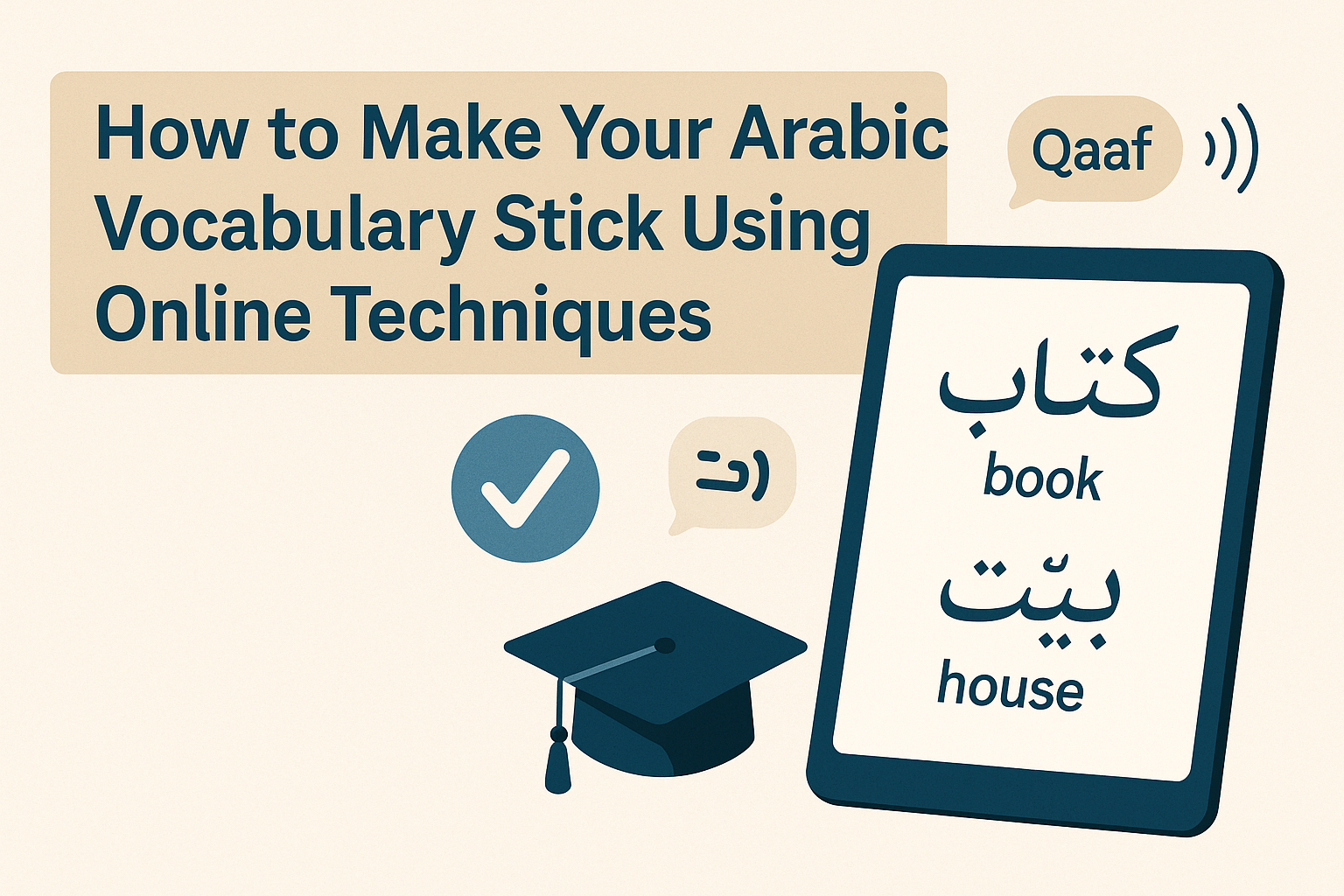How to Make Your Arabic Vocabulary Stick Using Online Techniques

Introduction
Learning Arabic is a rewarding journey that opens doors to a rich culture, history, and countless opportunities. However, one of the biggest challenges learners face is retaining new vocabulary. Many students struggle to remember Arabic words long after their first encounter. If you want to truly master the language, it is essential to make your Arabic vocabulary stick.
Fortunately, with the rise of digital technology and online learning tools, there are effective ways to not only learn but also retain Arabic vocabulary. In this blog, we’ll explore proven online techniques to help you internalize Arabic words and phrases so they become part of your active language skills. And if you’re looking for the best platform to start or boost your Arabic learning journey, Al Arabiya Institute offers top-quality online Arabic courses with great prices and free trial lessons to help you get started.
Why Vocabulary Retention Is Key in Learning Arabic
Before diving into techniques, it’s important to understand why making your Arabic vocabulary stick is crucial:
-
Foundation for communication: Vocabulary is the building block of any language. Without a strong vocabulary base, expressing yourself or understanding others becomes difficult.
-
Boosts confidence: Knowing words means you can participate more actively in conversations, read texts, and write with ease.
-
Enhances comprehension: The more words you remember, the better you understand listening and reading materials.
-
Accelerates learning: A solid vocabulary makes it easier to learn grammar and sentence structures since you recognize words instantly.
Common Challenges in Retaining Arabic Vocabulary
Arabic poses unique challenges to learners:
-
Different script: Arabic script differs greatly from Latin alphabets, requiring memorization of letter shapes and writing.
-
Pronunciation: Arabic has sounds unfamiliar to many learners, making it hard to recall words accurately.
-
Word roots and patterns: Arabic vocabulary often involves root patterns, which can confuse learners.
-
Context-dependent meaning: Many Arabic words have multiple meanings depending on context.
To overcome these obstacles, it’s vital to employ methods that reinforce memory and use the language actively.
Proven Online Techniques to Make Your Arabic Vocabulary Stick
1. Use Spaced Repetition Systems (SRS)
One of the most scientifically-backed methods for vocabulary retention is spaced repetition. This technique involves reviewing words at increasing intervals just before you forget them, strengthening long-term memory.
There are excellent online apps tailored for Arabic learners, such as Anki, Memrise, and Quizlet, which use spaced repetition algorithms.
-
Tip: Create your own flashcards with Arabic words, pronunciation, and example sentences. Regularly review them as per the app’s schedule.
-
Why it works: SRS leverages the brain’s natural forgetting curve, helping you retain vocabulary efficiently over time.
2. Engage with Interactive Arabic Content
Passive reading or rote memorization isn’t enough. To make your Arabic vocabulary stick, you need active engagement:
-
Watch Arabic videos with subtitles: Choose beginner-friendly clips or Arabic news with subtitles to hear words in context.
-
Listen to Arabic podcasts: Podcasts designed for learners provide repetition and natural use of vocabulary.
-
Use language learning platforms: Websites like Al Arabiya Institute incorporate interactive exercises and quizzes tailored to reinforce vocabulary.
Engaging multiple senses (hearing, seeing, speaking) helps create stronger memory associations.
3. Incorporate Vocabulary into Daily Life Using Apps
Language apps like Duolingo, Babbel, or Drops encourage daily vocabulary practice through bite-sized lessons.
-
Set daily goals: Consistency is key. Spend at least 10-15 minutes each day reviewing and learning new Arabic words.
-
Use app notifications: Let apps remind you to practice vocabulary regularly.
-
Practice writing: Some apps allow writing practice, which helps reinforce the Arabic script.
4. Create Personalized Vocabulary Lists and Use Them
One way to make your Arabic vocabulary stick is to build your own vocabulary lists focused on your interests, profession, or daily needs.
-
Use online spreadsheets or note apps to jot down new words.
-
Add meanings, example sentences, and synonyms.
-
Review and update the list regularly.
Personalized vocabulary feels more relevant, making it easier to remember.
5. Practice Speaking with Native Speakers Online
Speaking and using vocabulary actively helps solidify retention.
-
Use language exchange platforms such as italki, Tandem, or HelloTalk.
-
Join Arabic online study groups or forums where you can chat and exchange vocabulary.
-
Many online Arabic courses, including those at Al Arabiya Institute, offer live speaking practice with native teachers.
Speaking reinforces recall and pronunciation, helping vocabulary stick long-term.
6. Use Mnemonics and Visual Aids
Memory aids like mnemonics or associating words with images can boost retention.
-
Create funny or vivid mental images linked to Arabic words.
-
Use online tools that combine vocabulary with pictures.
-
Make flashcards with images and audio.
The brain remembers stories and images better than isolated words.
7. Write Regularly in Arabic
Writing exercises engage recall and reinforce vocabulary.
-
Keep a daily journal in Arabic, even if it’s just simple sentences.
-
Write short paragraphs or dialogues using new words.
-
Submit writing for feedback on language forums or through your Arabic course.
Writing activates different cognitive pathways, helping words stick in your memory.
8. Use Online Quizzes and Games
Gamified learning boosts motivation and retention.
-
Try online Arabic vocabulary quizzes.
-
Use games that involve word matching, crosswords, or fill-in-the-blanks.
-
Platforms like Al Arabiya Institute include fun quizzes as part of their curriculum.
Games turn vocabulary practice into an enjoyable activity rather than a chore.
Why Choose Al Arabiya Institute to Help You Make Your Arabic Vocabulary Stick?
If you want a proven, comprehensive way to learn Arabic vocabulary online, Al Arabiya Institute is one of the best platforms available today.
Here’s why:
-
Expert teachers: Learn from native Arabic-speaking instructors with years of teaching experience.
-
Tailored courses: Whether you’re a beginner or advanced learner, there’s a course designed to help you build vocabulary effectively.
-
Interactive methods: Lessons include flashcards, quizzes, speaking practice, and writing assignments to ensure vocabulary retention.
-
Affordable prices: High-quality Arabic education with some of the best prices on the market.
-
Free trial lessons: Try before you buy! Experience a free trial lesson to see if the teaching style fits your needs.
By joining Al Arabiya Institute, you get access to structured courses focused on helping you make your Arabic vocabulary stick through a blend of traditional and modern learning techniques.
Additional Tips to Maximize Vocabulary Retention Online
-
Set realistic goals: Don’t overwhelm yourself. Aim for learning 5-10 new words daily and reviewing old ones.
-
Stay consistent: Short daily sessions work better than occasional long ones.
-
Mix techniques: Use a combination of listening, speaking, reading, and writing.
-
Be patient: Vocabulary retention takes time and repeated exposure.
-
Immerse yourself: Surround yourself with Arabic media online, such as YouTube channels, Arabic music, and social media pages.
Conclusion
Learning Arabic vocabulary doesn’t have to be frustrating or forgettable. By adopting effective online techniques like spaced repetition, interactive content, speaking practice, and writing, you can make your Arabic vocabulary stick and build lasting language skills.
Remember, the key is consistency, engagement, and choosing the right tools. If you want a trusted, affordable, and comprehensive online Arabic learning experience, Al Arabiya Institute is your go-to platform. With expert teachers, personalized courses, and free trial lessons, they make it easier than ever to master Arabic vocabulary and become fluent.
Visit https://learning-arabic.com/ today to start your journey and discover how you can make your Arabic vocabulary stick for life!








